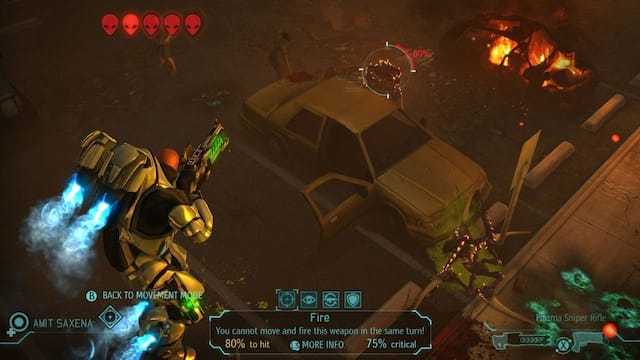The Kill Screen Review: XCOM: Enemy Unknown

Describing the title character in his novel The Irreversible Decline of Eddie Socket, the novelist John Weir wrote, “He has the dignity of falling apart spectacularly, in a way I wouldn’t have thought possible. And I think, if there is integrity in what cannot be helped, this is the bravest man alive.”
This is what struggling through the single player campaign of XCOM: Enemy Unkown feels like. To say the game is “hard” is an understatement. This isn’t a game that’s meant to be won, or explored endlessly for the sake of the arbitrary or mundane experience of an “advanced hiking simulation” like Skyrim. It’s instead a challenge that’s meant to be survived. That may not sound fun at first, but as an investment it’s irresistibly intriguing.
Jesper Juul, the self-described “video game theorist” that’s lately been ruminating on questions of difficulty, told me that most videogames today “are not designed to allow for failure. Even in a game that’s considered very difficult, like Dark Souls, the player can find another way around a challenge,” often by way of retreating until new abilities or superpowers are acquired.

XCOM’s rare beauty stems from this essential difference. I understand why the game pays such clear and direct homage to the comical campiness of its predecessor: without a lot of overblown Russian accents, tiny Men in Black-like gray Martians, and melodramatic monologues about the fate of humanity, XCOM: Enemy Unknown would be impossibly bleak. And even then, while I struggled to keep a straight face while my virtual military advisers worried about the growing intergalactic threat shown by a meter not-so-subtly called “the doomtracker,” playing XCOM for the first time in almost a decade felt almost, well, depressing.
The game lets you fail, and fail spectacularly. As a design decision, this becomes apparent the first time a squad mate falls backward in a pulpy spray of blood and anguish after I placed him too close to the iron sights of an angry Martian. I waited, half expecting a death screen to interject politely, apologizing for the delay and asking if I would like to try again.
But nothing comes. The dead soldier keeps being dead. Whatever time you invested in his tactical abilities or details (as minute as his facial hair and racial heritage) can’t suddenly bring him back to life.
This is the first difference I notice when playing XCOM: the nearly complete lack of death screens to punctuate my every misstep, and thereby necessitate revision. Instead, the game simply continues. Only now, I’m left with a gaping hole where my favorite soldier used to be. Instead of just wondering how on Earth I’m going to survive the next mission without his well-placed rocket fire, I start to experience something that feels like real human grief.
How many games have actually been brave enough to let you fail quite so blindly?
The original XCOM was difficult too, but it was difficult in a more harried and unpredictable way. Players would step gingerly off the drop ship, only to have half their squad murdered before they took a step. It was an almost existential type of difficulty that left you drained and dispirited. More often than not, after hunting through a dark and gloomy row of cornfields only to have a single flash of some laser kill the other half of my team out of the blue, I would simply walk away for days, months, or even years before braving the game again.
XCOM: Enemy Unknown feels just as difficult, but it’s a game I don’t want to stop playing. The 90’s-era gaming nostalgic will most likely counter that this just shows I was never good enough to meet the first game’s brutal standards. And they may be right.
But whatever Firaxis managed to salvage from the wreckage of XCOM’s legacy, they turned into a surpassingly tight and smart game. Instead of stepping into the dark in the vain hope that you may actually survive disembarking the drop ship, Enemy Unknown offers a small handful of finely tuned micro-decisions to advance every turn. I found myself wavering uncertainly over the bright red figure of a shot probability for minutes, agonizing over the cost of advancing a unit or taking the risk to flush some particularly nasty green mutant out of cover.
The campaign seamlessly prevents routine, acclimation. Giant flying saucers suddenly appear out of the sky to send death rays (yes, death rays, I don’t know what else to call them) at my suddenly underequipped soldiers. Massive, hulking red beasts with wolverine claws lunge out of the dark.
The real challenge, however, sets in with the meta-game of base-building. XCOM, at its core, is a game about management—from the second-by-second decisions made in the matches themselves to the overarching financial trade-offs you must decide between to advance. The challenge is summing up the courage to face this irreversible decline head on, to perform gracefully under a pressure so intense that loss becomes a terrifying inevitability.
The reality of this imminent failure makes XCOM a more thrilling experience than any other game I can recall from recent memory. Late in the campaign, I was struck with the bitter realization that I had left my base’s external defenses woefully underprepared for the new class of killer death rays that now threatened earth. I was angry for a moment at something that seemed like a design oversight—not making it abundantly clear that I needed to be covering all my bases, literally. But the game itself just shrugged its shoulders, and pressed me with even more challenges.
I faced the fear, in other words, that after spending more than a week laboring over decisions as minute as how many feet to advance my troops—decisions painstakingly crafted to keep as many of them alive as I possibly could—I might still lose the game and not just be able to click “try again.”
And how many games have actually been brave enough to let you fail quite so blindly? Hopefully thanks to XCOM, there will be more soon.



